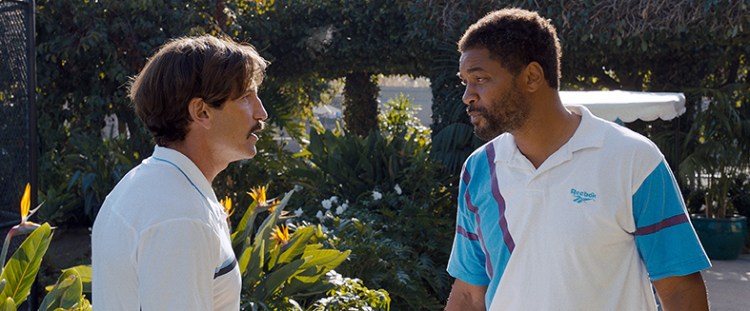Will Smith delivers a ferocious, all-consuming performance in “King Richard,” a thoroughly entertaining portrait of Richard Williams – better known as Venus and Serena’s father.
In this alternately funny, poignant and inspiring movie, the focus isn’t on the sports prodigies who would one day attain legendary status on the tennis circuit. Instead, screenwriter Zach Baylin takes a more oblique approach, focusing on the man whose determination, ambition and sometimes overweening ego helped make his children champions. Directed by Reinaldo Marcus Green with a minimum of fuss and generous helpings of wit and uplift, “King Richard” might sand off the sharper edges of its real-life protagonist – but it’s in service to the kind of family-friendly film that audiences crave, despite Hollywood’s chronic and inexplicable indifference.
We meet Richard when his daughters are still young, and he’s drilling them at a public court near their home in Los Angeles’ Compton neighborhood. Taping up handmade inspirational posters, barking at Venus (Saniyya Sidney) to open her stance, Richard also must fend off local gangs, as well as a disapproving neighbor who thinks he’s working his children too hard. Serena (Demi Singleton) shows promise too, but it’s her big sister who has reached the point at which Richard’s coaching isn’t enough. Taking the girls to the country clubs and elite academies where stars like Pete Sampras and Jennifer Capriati train, Richard assures them in no uncertain terms that they have every right to be there, despite the patronizing skepticism and outright hostility that give the term “tennis whites” a whole new meaning.
Richard, who grew up in Louisiana when the Ku Klux Klan rode with impunity, has a bone-deep understanding of racism – at its most florid and deeply coded. One of the most emotionally powerful elements of “King Richard” is how he navigates an oppressive system in ways to protect Venus and Serena from it and steel them to its most harmful depredations. Working from his now-famous 85-page plan, Richard embodies the kind of tireless commitment, tenacious advocacy and occasionally confrontational style that generations of African American parents have had to adopt to secure their kids a seat at the table that, all these decades later, still hasn’t been set for them.
As one of the biggest celebrities in the world, Smith has become such a global commodity that it’s easy to forget what a fine actor he is. “King Richard” is here to remind us, in a central performance that is just as uncompromising and all-engulfing as the title character himself. Even more gratifying is the way Aunjanue Ellis winds up stealthily stealing the movie despite her co-star’s gravitational charisma: As Richard’s wife Oracene “Brandy” Williams, she takes the otherwise underwritten role of patient helpmeet and gives it her own brand of quiet but sinewy strength. The unspoken, delicious frisson of “King Richard” comes from the audience knowing what will ensue after Brandy decides to coach Serena herself when Richard is preoccupied with positioning Venus for stardom.
Indeed, knowing how this particular story ends isn’t a detriment as much as an added narrative thread in “King Richard,” which co-stars Jon Bernthal in a warmly comic turn as the perennially exasperated coach Rick Macci. Given the horror stories that abound about male coaches and female athletes, “King Richard” provides a welcome, wholesome flip side.
“King Richard” isn’t perfect. It’s overlong and repetitive, and there’s no doubt that Richard Williams has a darker side to him, as has every biopic subject since the beginning of cinematic time. Smith refuses to conceal that darkness – it’s there simmering just under the blustery bravado – but he prefers to keep his character in the light, by way of a character who embodies parental devotion at its most loving and lionhearted.
Send questions/comments to the editors.



